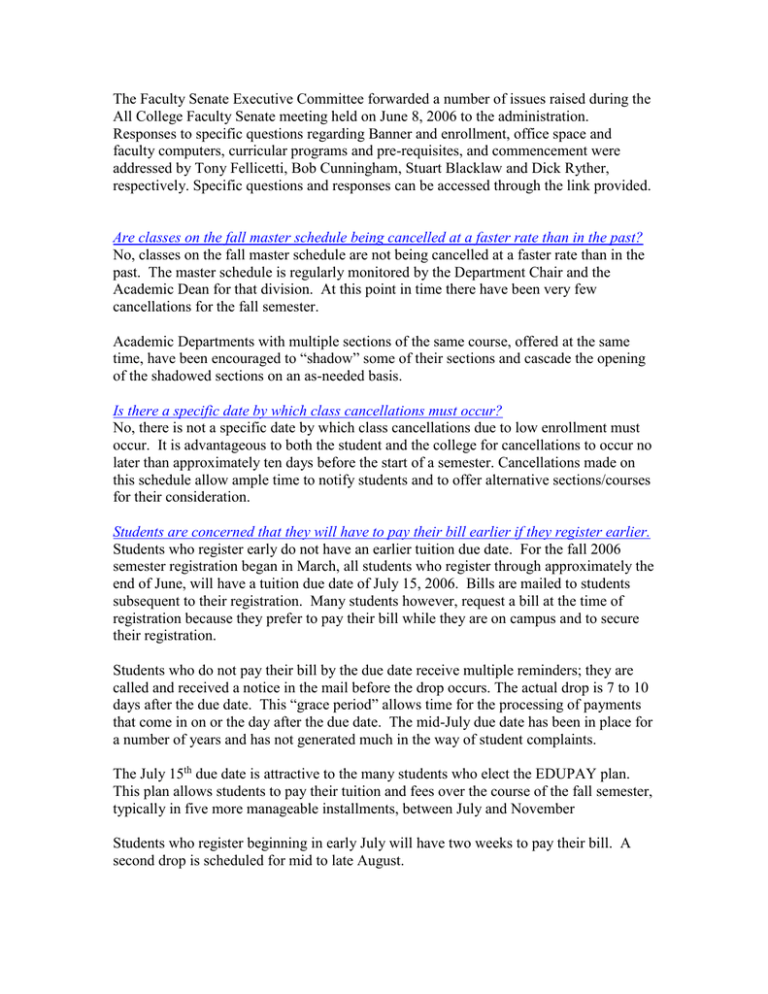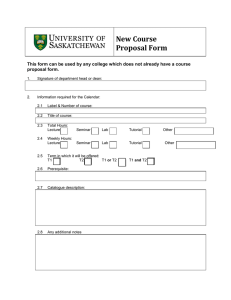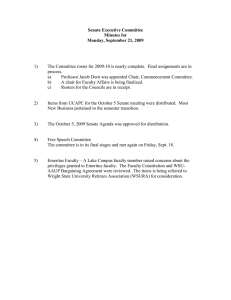Tribune Q & A.doc
advertisement

The Faculty Senate Executive Committee forwarded a number of issues raised during the All College Faculty Senate meeting held on June 8, 2006 to the administration. Responses to specific questions regarding Banner and enrollment, office space and faculty computers, curricular programs and pre-requisites, and commencement were addressed by Tony Fellicetti, Bob Cunningham, Stuart Blacklaw and Dick Ryther, respectively. Specific questions and responses can be accessed through the link provided. Are classes on the fall master schedule being cancelled at a faster rate than in the past? No, classes on the fall master schedule are not being cancelled at a faster rate than in the past. The master schedule is regularly monitored by the Department Chair and the Academic Dean for that division. At this point in time there have been very few cancellations for the fall semester. Academic Departments with multiple sections of the same course, offered at the same time, have been encouraged to “shadow” some of their sections and cascade the opening of the shadowed sections on an as-needed basis. Is there a specific date by which class cancellations must occur? No, there is not a specific date by which class cancellations due to low enrollment must occur. It is advantageous to both the student and the college for cancellations to occur no later than approximately ten days before the start of a semester. Cancellations made on this schedule allow ample time to notify students and to offer alternative sections/courses for their consideration. Students are concerned that they will have to pay their bill earlier if they register earlier. Students who register early do not have an earlier tuition due date. For the fall 2006 semester registration began in March, all students who register through approximately the end of June, will have a tuition due date of July 15, 2006. Bills are mailed to students subsequent to their registration. Many students however, request a bill at the time of registration because they prefer to pay their bill while they are on campus and to secure their registration. Students who do not pay their bill by the due date receive multiple reminders; they are called and received a notice in the mail before the drop occurs. The actual drop is 7 to 10 days after the due date. This “grace period” allows time for the processing of payments that come in on or the day after the due date. The mid-July due date has been in place for a number of years and has not generated much in the way of student complaints. The July 15th due date is attractive to the many students who elect the EDUPAY plan. This plan allows students to pay their tuition and fees over the course of the fall semester, typically in five more manageable installments, between July and November Students who register beginning in early July will have two weeks to pay their bill. A second drop is scheduled for mid to late August. Students have reported problems with their PIN number when attempting to register in Banner. Student PIN problems have been investigated and a number of changes have taken place to reduce the problems students have experienced. We have eliminated the PIN expiration date so students are not mandated to immediately change their PIN. The need to change a PIN on the first entry in self service caused students to believe their PIN was not functioning correctly. We have also given security access to reset PINs to a larger group of staff working with students from departmental secretaries to counselors and advisors. This should allow for faster resolution for students who forget their PINs. When is the college going to address office space concerns? Architectural planning will commence shortly for the construction of the new Wolk building to address the needs of our Nursing program. One of the results of this construction will be the anticipated relocation of all Nursing faculty offices to the newly constructed addition, freeing up faculty office space in building 8. This will allow the existing Nursing faculty offices to be utilized by other department(s). Other than these offices, at this time, it is unlikely that there will be any additional capital dollars available for office space in the near future (2-3 years). The possibility does exist for some office space at Brighton, once the Ren Square project is complete, but it is premature at this time to determine the extent to which this will occur. In the 2008-1013 Master Plan additional offices will be addressed. Will faculty members be involved in the planning of office space with new construction projects? As in previous construction projects faculty will participate in the planning process. At the current time we have a design team working with the county on the Ren Square project and several academic departments have been consulted and will continue to be consulted throughout the duration of the process. Concerning the Brighton campus, once again a design team has been established and both the Nursing faculty and the Massage Therapy department will be involved in this process. Decisions will be made as to the reallocation of offices further in the planning process. What is the College doing to keep technology on faculty desktops current? MCC has long been known for providing the best possible technology to our students, faculty and staff. With approximately 3000 PC's at MCC, the CNS team is constantly installing new computers and redeploying cascaded computers. Faculty may request a new redeployed computer if they feel they need an upgrade. This request would go to the chair for their input and then be communicated to me. If a cascaded computer is available that fits the needs of the faculty, arrangements will then be made with CNS for the installation of the computer. If a department has budget monies available, computers for faculty can be purchased from our vendor, Brite computers. If a department has earned professional development money, these can also be utilized for the purchase of office computers. Who is allowed to change curriculum for programs? Can the curriculum be changed against the will of a department based on low numbers? Program changes may be proposed for any reason and proposals may come from faculty, administration or students. The Faculty Senate Resolutions (2.1.1(2)) say, “proposals for curriculum changes may be submitted to the Curriculum Committee by Department Chairpersons, individual faculty members, administrative personnel, and the Student Senate.” While proposals may start in any number of places, they always end in the same office. The Vice President for Academic Services has the responsibility and authority to make a final determination about any and all proposed changes to the curriculum beyond minor editorial changes. To assist the Vice President in her decisions, a very inclusive curriculum process has been developed. Each proposal for change in a program allows for comments by members of the campus community. Proposals for changes are reviewed by the program’s home department and Division Dean, the Curriculum Committee, the Dean of Curriculum and the Faculty Senate, and each of these units/individuals will act to support or not support the proposal. All of these actions are ultimately recommendations to the Chief Academic Officer. Who is allowed to override course pre-requisites when enrolling students in course? The Faculty Senate Resolutions do not delineate prerequisite override authority per se, although the authority may be inferred as residing with the department chair and with the instructor of the specific course section. Various departments have established their own rules based on their needs. As a result policing overrides under a dozen different systems is impossible for Records and Registration. They trust faculty to operate in accordance with departmental policies. The office can generate reports, however, so individual departments may investigate any course for which they believe there may be a problem. For example, ASL 102 has a prerequisite of ASL 101. A student may arrive with some training and experience equivalent to 101, and it is up to the department to determine who may make that judgment. If the department members detect that waivers are being issued outside the policy, the department may work with Records and Registration to identify the source(s) of the unauthorized waivers and work with those departments or individuals to reinforce compliance with the departmental rules. Departments may find that the prerequisite that might produce the best result – for example “permission of instructor” – does not allow computer prerequisite checking, and therefore a more generic prerequisite is chosen because it is less labor intensive. When posted prerequisites are not exactly what a department wants, overrides might happen more frequently. Since heavy waiver volume is not necessarily an indication of abuse, departmental monitoring of the issue may be the only way to find which courses might need review. The commencement speakers in the last few years have all been business related with messages about staying in Rochester. Why don’t we have speakers talking about issues students are concerned with? President Flynn has the responsibility to select the Commencement speaker each year. He has indicated that he welcomes input from the College community in this process. Faculty can submit recommendations directly to President Flynn, or recommendations can be directed to the Commencement Committee. As chair of the committee I can forward recommendations to the committee and to Mr. Flynn. What can be done to get faculty more involved in graduation? Currently, faculty can’t even congratulate their students because of how far away they sit. MCC’s Commencement Committee is primarily involved with the logistical coordination of the event, and involvement from faculty would be welcome. Please let Dick Ryther know of your interest as soon as possible. Faculty involvement in the lining up of students in the basement of the Blue Cross Arena prior to the processional is always welcome. Many faculty already assist in this process where graduates are lined up according to the degrees they have earned. The help is greatly appreciated and this process allows faculty and staff to mingle and talk to the graduates in their curriculum. This is a huge undertaking and the extra help would be welcome. Faculty also assist with marshalling the students and faculty into their seating areas, and the students are marshalled to the stage to be recognized by degree program. Most of these marshalls have been non-teaching faculty, but there have also been teaching faculty who assist. The Commencement Committee and Student Services welcomes input from faculty and appreciate the assistance many faculty offer to the ceremony. More input and involvement will only enhance the ceremony as we honor our graduates.

